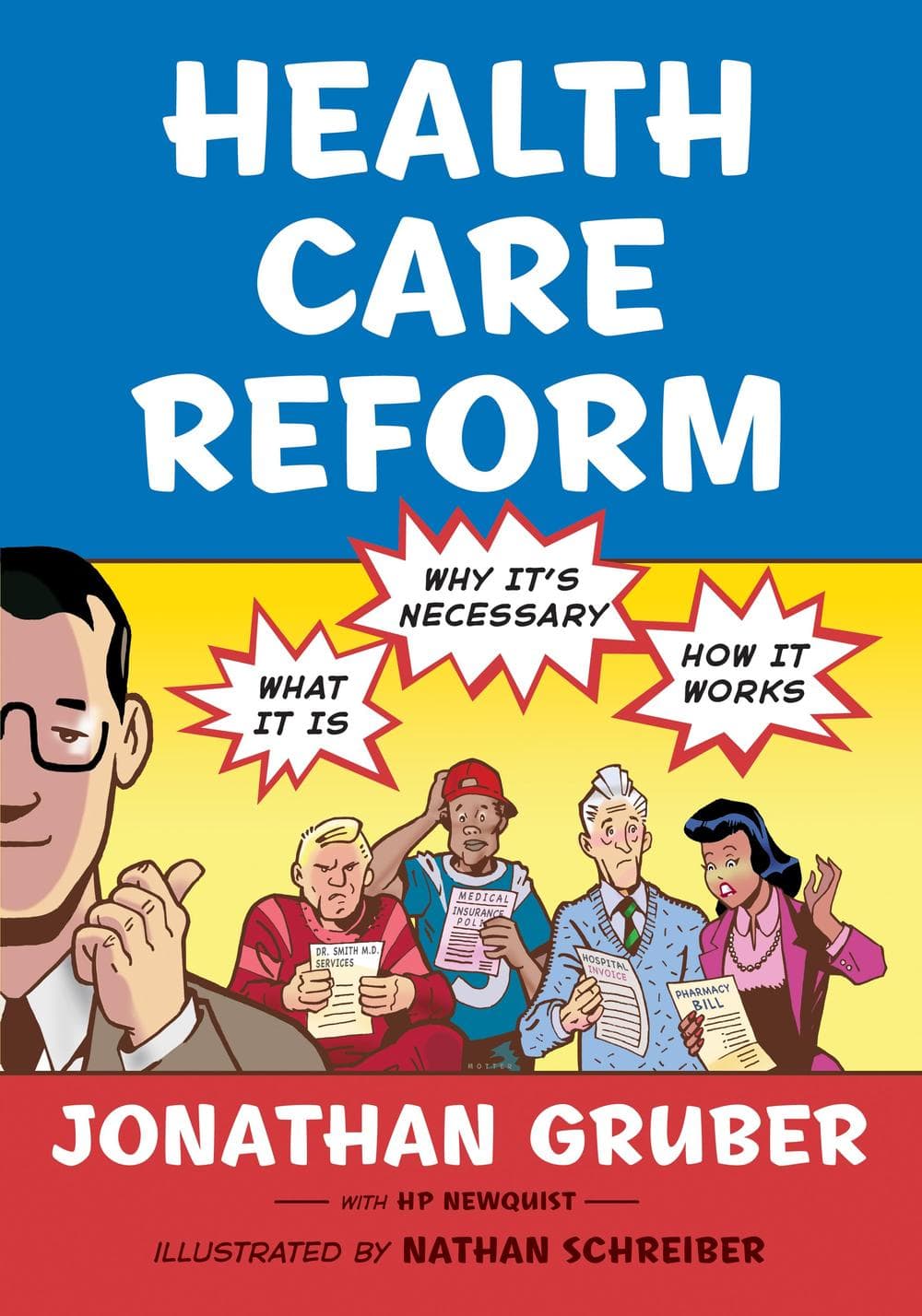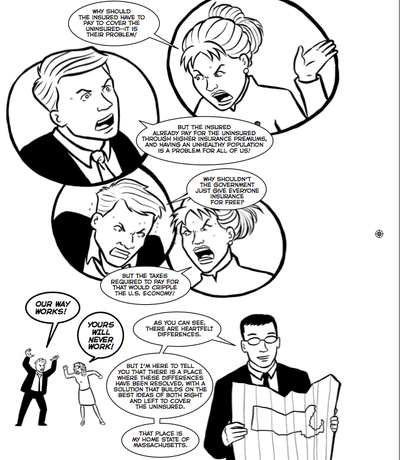Advertisement
A Sneak Peek At 'Health Reform: The Comic Book'

MIT economist Jonathan Gruber calls health care reform the "biggest social policy legislation since Medicare." So what better way to explain such a serious, complex and far-reaching topic than through comics?
Gruber, an advisor to President Obama on national reform and a key architect of Massachusetts reform, says he was hesitant to distill such a weighty subject into comic book form but in fact, by explaining the problem graphically, through characters like Betty on Medicare or unlucky Carlos who has to buy his own health insurance, Gruber covers a lot of ground, and is able to lay out the various issues and make his case for the national health law on both a macro level and through gritty details. ("There are no death panels," the comic-book Gruber, black-and-white and bespectacled, tells a ranting grandmother-type shaking her cane.)
One measure of the book's clarity and accessibility is that my 8-year-old daughter picked up my review copy and started reading. Health Care Reform: What It Is, Why It's Necessary, How It Works, will be published by Hill and Wang in January. I spoke briefly with Gruber this week and agreed to post only one image, for now. There's more to come, though, so stay tuned.
[module align="right" width="half" type="pull-quote"]Mitt Romney is the single person most responsible for health care reform in this country.[/module]
What's the appeal of a comic book on health reform?
I think what really convinced me, when you want to educate people, the comic is a great way to do it. When an airline wants you to know what to do in case of an accident, they give you a comic.
Here we have perhaps one of the most complicated topics that people deal with in society, so the idea of explaining it in a comic form is appealing. Really, it's not a comic book, it's a graphic novel, it's trying to use pictures to make compelling what is essentially dry — let's face it, this is not exciting, it's not funny, it's fundamentally a policy argument. Using pictures allows you to use fewer words.
I didn't appreciate it until I got into the process. Health reform is incredibly hard. I mean, there's an easy way — single-payer — but that wasn't in the cards. If you're going to do reform through a private-based system, it's going to be complex.
What was the challenge of distilling the content?
I've spent a lot of time speaking about this at a not-so-high level so I've already figured out how to explain it in plain English. I had a co-writer, [HP Newquist] a guy who the company works with to do these graphic novels. I submitted a 30-page outline with all the points I wanted to make in the order I wanted to make them. And he helped me turn them comic book-y. I don't think I could do this on my own. The thing that was hardest was all the stuff about cost control at the beginning of the book, but it was less about the wording and more about the pace and layout. Like, 'You want to make this point, that can be made in one panel, but this point will take three panels.' The difference was the emphasis, how to spread it out to fit with the pictures.
Who do you imagine will be the audience for this book?
Lots of people say, 'I'm hearing all these things about Massachusetts health reform, what's the deal?' Or, my father called and said, 'My colleagues heard Massachusetts health care is a disaster.' The audience is people who haven't made up their minds, but are worried about what they hear — for the people on the right and the left who are worried. The other audience is people on the left who are not as excited as they should be — that just drives me bonkers. The fact that the left aren't thrilled with Obama is crazy.
How do you hope the book will influence the politics of health care reform?
I want to get the left excited in the re-election campaign...This is the biggest social policy legislation since Medicare. What would make me happiest is if the people at the center who are skeptical become supportive and people on the left who are mildly supportive become wildly supportive.
What about Mitt Romney?
I think Mitt Romney is the hero of this story. But I want to make clear that the way he's portrayed in this book has nothing to do with his presidential campaign.
Mitt Romney is the single person most responsible for health care reform in this country: Without his leadership we don't get reform in Massachusetts, and without Massachusetts reform we don't get national reform.
For a book marketed as a "comic" it's not double-over-with-laughter funny. Do you regret that?
I wish I could have made it more funny, but at the end of the day, it wasn't worth forcing humor in. It wasn't worth sacrificing clarity.
I have to say, I was hesitant about doing this — I used to give my son such a hard time about all the time he spent on his graphic novels. My kids were the ones who insisted I do it. When they were younger they used to ask, 'Why don't you do research on something interesting?'
In my profession it's often hard to get out there and connect with people...Now my wife's the most excited about [the book]. Her friends don't know exactly what I do, now she has something to show them.

(By the way, if anyone puts out an edifying comic book on what's wrong with health reform, we'll gladly publish images from that, too.)
This program aired on October 28, 2011. The audio for this program is not available.
